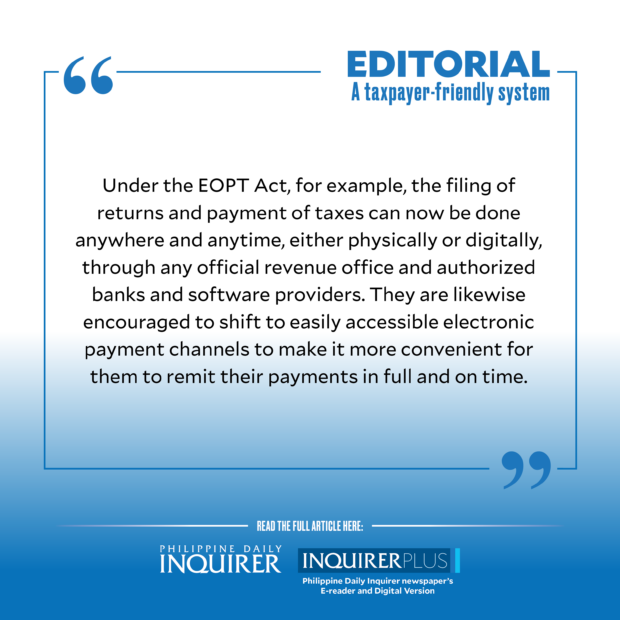A taxpayer-friendly system

Filipinos will no longer have an excuse to procrastinate on fulfilling their obligation to pay taxes now that President Marcos has signed Republic Act No. 11976, or the Ease of Paying Taxes (EOPT) Act, to streamline the country’s tax collection system and making it more convenient for taxpayers.
Albay Rep. Joey Salceda may not be exaggerating when he described the new law as “the most comprehensive tax administration reform” since the National Internal Revenue Code came into effect in 1997, as it comes with key provisions that would be good news to both individual and corporate taxpayers.
Under the EOPT Act, for example, the filing of returns and payment of taxes can now be done anywhere and anytime, either physically or digitally, through any official revenue office and authorized banks and software providers.
Taxpayers thus are no longer limited to just paying to their own city or municipal treasurer. They are likewise encouraged to shift to easily accessible electronic payment channels to make it more convenient for them to remit their payments in full and on time.
Simplified tax returns
Plus, taxpayers will be classified into micro, small, medium, and large based on their gross sales so that the tax system can respond to each segment’s unique needs, which will be particularly helpful to the small taxpayers who deserve simplified tax returns and processes as they do not have the luxury of having an army of accountants behind them.
The new law also provides that local registration facilities be available to Filipinos overseas, a relief to Filipinos abroad who may want to set up a business in the country but are currently restricted because they will have to do their paperwork and complete their payments here under previous laws.
Another key provision is the mandate for the Bureau of Internal Revenue (BIR), which collects about 80 percent of the country’s total tax take, to formulate and then implement the Ease of Paying Taxes and Digitalization Roadmap, to bring the country’s tax system with its numerous antiquated items into the digital age.
The objective of the mandated digitalization push, according to Finance Secretary Benjamin Diokno, is to “promote and assist taxpayers by streamlining tax processes, reducing documentary requirements, and digitalizing its services.”
Taxpayer’s Bill of Rights
It is in line with this effort that the number of income tax return pages will be reduced from four to two pages only, welcome news for harried taxpayers long burdened by voluminous and complex documents and processes when paying taxes is already unpleasant albeit necessary.
There are other welcome changes such as the streamlining of the value added and withholding tax systems. The EOPT Act also provides a 180-day period for the BIR to process general refund claims on erroneous or illegally collected taxes.
Finally, the EOPT law contains a Taxpayer’s Bill of Rights and Obligations and designates a Taxpayers’ Advocate Office to ensure fair treatment and to protect taxpayers against wrongful assessments.
All together, the EOPT Act’s laudable provisions should indeed achieve the government’s goal of bringing in more Filipinos into the tax net and make it more convenient for them to pay their taxes.
Increased taxes will, in turn, help the government achieve its social and economic development agenda.
Improving tax compliance
“We are off to a good start this 2024. By making the tax system more taxpayer-friendly through simplified tax filings and protecting taxpayers’ rights, we will achieve our goal of encouraging and improving tax compliance,” said Diokno.
Mr. Marcos had included the EOPT Act as a priority legislation in his State of the Nation Address and described it as a testament to the government’s commitment “toward a dynamic and efficient tax administration which is responsive to the needs of our taxpayers” and which “adapts to the changing times, and ultimately supports our recovery and growth objectives.”
But just like any law, even one with such unquestionably beneficial provisions such as the EOPT Act, its true worth will only be determined upon implementation in about three months.
Prosecute tax evaders
Thus it will now be up to the BIR to use the time to step up and overhaul its own systems and processes to ensure that the benefits as envisioned by the law will actually be felt by taxpayers, who deserve the red carpet treatment in return for the hard-earned money that they contribute to government coffers.
The BIR can also take up the suggestion of Benedicta Du-Baladad, director of the Philippine Chamber of Commerce and Industry, to intensify its information campaign while the implementing rules are being crafted to ensure that more people and companies are aware and informed of their rights and benefits under the law that can indeed be a game-changer if executed properly.
Making the tax collection more efficient and more convenient is just one part of the BIR’s job. It must also be equally determined to prosecute tax evaders, especially the big and influential ones, to make the system truly fair and just.




















